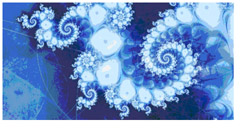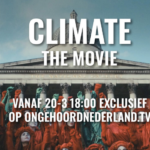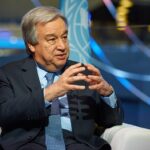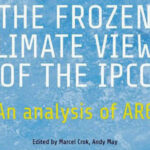
The meaning of pattern recognition in a complex system seems to be lacking it's due attention in climate research
Herewith I bring to your attention a working paper on perspectives of the continuation of climate change discussions that seems so far to have escaped the attention of scientific institutions and policymakers.
It is entitled:
Post-modern science and the scientific legitimacy of the IPCC’s WG1 AR5 draft report
with the major recommendation:
“that assessment studies on climate change should be undertaken by individual nations, quite independently from the IPCC, as India has already foreshadowed. These reviews would best be undertaken by senior and established scientists whose reputation rests on the traditional [enabling] disciplines upon which climate science is founded that underpin(underpin is a favourite IPCC term and not very meaningful) climate science, specifically physics, chemistry, geology astronomy, solar physics and meteorology. The audit assessments should adhere to the traditional principles of science, and should focus on the scientific methodology and empirical evidence that bear on hypothetical Dangerous Anthropogenic Global Warming (DAGW).”
My concern is not so much with the specific science details in the WG1 report, but more the overall scientific philosophy of the whole IPCC approach.
I suggest that scientists who are active in the discipline fields listed above take over the initiative to bring this recommendation to the attention of their local scientific and governmental authorities; and that they request action.
The former IPCC studies imply that dangerous anthropogenic global warming (DAGW) is occurring, and that this is caused by the accumulation of human-related CO2 in the atmosphere. As yet, however, no indisputable scientific proof, or even strong empirical evidence, has been provided for such an effect, which therefore remains a matter of speculation. This has long been pointed out, not only by natural scientists but also by political scientists who specialise in environmental policy-making.[1]
It can be expected that critical external reviewers of IPCC texts will challenge the recent internal IPCC assessment study with hundreds of arguments, based on observations, and by pointing also to the neglect of the scientific literature that argues against DAGW .
Critical considerations include:
– The general scientific tone of IPCC reports, with its subjective probability terminology, self-appointed “experts”, and lack of respect for alternative, independent views
– The prevailing and questionable practice of allowing climate model projections to be treated as deterministic, skilled predictions
– The neglect (in some cases almost forgotten) of insights arising from classical climatology.
– The absence of attention to important new achievements in the natural sciences, e.g. complexity theory
– The disputable quality of many IPCC-related assessment studies of the literature.
Finally, I plea for a return to traditional scientific principles in order to test the basics of the hypothesis that increasing CO2 concentration in the atmosphere significantly influences global average temperature and therewith is a climate danger.
[1] Sonja Boehmer-Christiansen & Aynsley Kellow, International Environmental Policy: Interests and the failure of the Kyoto Process, Edward Elgar Publishing 2002 .
=================================================================================
Nederlandse vertaling:
Een nieuw perspectief voor het klimaatdebat?
Post-modern science and the scientific legitimacy of the IPCC’s WG1 AR5 draft report
De betekenis van patroonherkenning in een complex systeem lijkt vooralsnog in het hedendaagse klimaatonderzoek onderbelicht te blijven.
Op dit moment heeft het IPCC een nieuwe evaluatiestudie in voorbereiding, gemerkt AR5, die in 2013 zal verschijnen. Er circuleert voor commentaar onder door het IPCC geaccepteerde ‘reviewers’ van werkgroep 1 (WG1) een concept over de stand van de klimaatwetenschap volgens het IPCC.
Op grond van de aard van dit concept zullen kritische reviewers constateren dat er onder de leidinggevende auteurs nog steeds weinig bereidheid is om zelfs maar te overwegen dat een mogelijke invloed van CO2 op het klimaat tot op heden overdreven is voorgesteld.
Die vastgeroeste opvatting over een door CO2 veroorzaakt versterkt broeikaseffect zal ongetwijfeld door de ‘klimaatsceptische’ reviewers op vele honderden punten worden bestreden. Met verwijzing naar waarnemingen die de broeikastheorie niet bevestigen en naar wetenschappelijke literatuur die door de auteurs van het concept WG1 AR5 rapport lijkt te zijn genegeerd.
De verwachting is echter dat dit gedetailleerde commentaar weinig invloed zal hebben op bijstelling van de tekst door de leidinggevende auteurs van het WG1 rapport. Een ander soort analyse op hoofdlijnen van de evaluatie van de stand van de klimaatwetenschap lijkt mij daarom gewenst. Zie hiervoor een voorstel.
POST-MODERN SCIENCE AND THE SCIENTIFIC LEGITIMACY
OF THE IPCC’S WG1 AR5 DRAFT REPORT
Arthur Rörsch, The Netherlands
(Third edition of a working paper, to be submitted to local authorities)
Aanhaling:
“It is recommended that assessment studies should be undertaken by individual nations, quite independently from the IPCC, as India has already announced. These reviews would best be undertaken by senior and established scientists whose reputation rests in the traditional enabling disciplines that underpin climate science, specifically physics, chemistry, geology, astronomy, solar physics and meteorology. The audit assessments should adhere to the traditional principles of science, and should focus on the scientific methodology and empirical evidence that bears on hypothetical Dangerous Anthropogenic Global Warming (DAGW).”
Het resultaat van een eerder initiatief van de KNAW, weergegeven in een inmiddels al veel besproken brochure over het klimaatdebat, is niet algemeen gewaardeerd. De KNAW heeft echter wel degelijk tot uitdrukking gebracht de klimaatdiscussie te willen voortzetten. Maar volgens mij mag dat geen bokswedstrijd blijven tussen alarmisten en sceptici die op punten willen winnen. Het gaat in bovengenoemde ‘working paper’ om het handhaven van principiële grondbeginselen in de traditionele beoefening van de natuurwetenschappen en een kritische beschouwing van de door het IPCC gebruikte methodologie.
Concrete onderwerpen zijn onder meer
– het gebruik van een waarschijnlijkheidsgradatie door het IPCC
– de toepassing van klimaatmodellen bij het onderzoek
– de inzichten over klimaatvariabiliteit die aan de klassieke klimatologie kunnen worden ontleend
– maar vooral ook de toepassing van nieuwe benaderingen in de natuurwetenschappen in het klimatologisch onderzoek via de complexiteitstheorie.







http://www.elsevier.nl/web/Nieuws/Wetenschap/3303…
Weinig aan toe te voegen :)
Het KNAW zegt de discussie voort te willen zetten maar gaat onverdroten verder met het verdraaien van de feiten.
Intussen heeft vrijwel iedereen met een beetje gezond verstand door dat de alarmisten(KNAW/KNMI/IPCC/NGC/WWF/Greenpeace/BBC/Al Gore/Kramer/Groen Links etc.) of hun zakken vullen, of napraters zijn of politici met een dubbele agenda zijn of eenvoudigweg geen hersens hebben.
Een discussie met deze doelgroep lijkt mij dan ook op voorhand al zinloos geworden. Hoelang moeten wij nog bloggen over een sprookje (of liever CO2 horror fictie) terwijl de echte problemen zich wereldwijd opstapelen? Hoeveel kinderen kunnen wij het leven redden in Afrika met de subsidie op 1 zinloze windmolen?
Persoonlijk aansprakelijk stellen voor: in de miljarden lopende economische schade, diefstal van de burger, oplichting, valsheid in geschrifte, meineed, kwakzalverij, dood door schuld (!! jawel) en echte schade aan het milieu.
Ik ben benieuwd of ze dan nog steeds zo “geloven“….
Ben
"De KNAW heeft echter wel degelijk tot uitdrukking gebracht de klimaatdiscussie te willen voortzetten." NOGAL WIEDES!
De klimaatdiscussie is van de hele vorige eeuw, en EIGENDOM van de politiek, en zal ook deze eeuw plaatsvinden bij de politieke belangengroepen.
Eerst het angstige roepen om overheidsmaatregelen toen in de jaren 50 en 60 van de vorige eeuw voor een nieuwe aanstaande IJSTIJD werd gevreesd.
Vervolgens werd ontdekt, dat industriële winst gekoppeld kon worden aan de relatieve opwarming in de jaren 80 en 90. De politieke drijfveren waren extra belasting, dure OVERHEIDS “klimaat”-programma’s en vooral extra ontwikkelingsgelden (geheel contraproductief) voor de opbouw in Afrika.
Dat kon slechts met politiek-dogmatische en verzonnen alarmistische klimaatmodel-projecties door politiek gesubsidieerde overheidsorganen (IPCC/IAC/KNAW/PBL en een heleboel NGO's).
Nu sinds 1998 is er wederom GEEN wereldwijde opwarming meer en sinds 2004 is er zelfs een neergaande klimaattrendlijn.
Inmiddels werden diverse VN-klimaatrapportconclusies en FRAUDULEUZE gegevensmanipulaties binnen het IPCC aan de kaak gesteld door echt kritische klimaatwetenschappers en is de AGW slechts tot een politieke ballon geworden, die langzaam leegloopt.
Nu zelfs in Nederland de socialistische Volkskrant "om is" en stelt, dat het TOTAAL ZINLOOS is om dure “klimaat”-programma’s overeind te houden, die veel geld kosten en die gebaseerd zijn op "onweerlegbare" bewijzen die slechts onrust zaaien, maar onhoudbaar zijn, dus nu wil de KNAW de klimaatdiscussie levend houden! Zover is het nu!
Gezien de politieke belangen in afhankelijk subsidieland het (Politiek-Ambtelijk-Onderwijs-Onderzoeks-NGO-Complex) kan ik de KNAW haar huidige non-kritische/klimaat-alarmistische acteren geheel begrijpen.
De vraag is, of de KNAW met haar tentakels in de geheel gepolitiseerde maatschappij en media in het "Klimaatdebat" het handhaven van principiële grondbeginselen in de traditionele beoefening van de natuurwetenschappen en een kritische beschouwing van de door het IPCC gebruikte methodologie wil accepteren.
Duidelijk geworden is: TOT OP HEDEN NIET!
KNAW is aan zet!
Dat fotootje doet met denken aan Benoit Mandelbrot, enige relatie, Arthur?
Tinstaafl, het is inderdaad een fractal. Niet meer dan een demonstratie dat je met tamelijk eenvoudige vergelijkingen de meest wonderlijke patronen kan opwekken. Verder doet het plaatje er niet zoveel toe. Maar climategate.nl wil altijd graag een illustratie toevoegen.
Beste Arthur,
Richard Feynman (geciteerd door Judith Curry) zei het zo: “Scientific knowledge is a body of statements of varying degrees of certainty — some most unsure, some nearly sure, but none absolutely certain.” Dit geldt voor alle wetenschappelijk kennis, en zeker ook voor onze kennis van complexe systemen, zoals het klimaat.
De wetenschappelijke methode probeert zekerheid te vergroten door het doen van waarnemingen, het opstellen van alternatieve hypotheses, enz, enz.
Jaynes heeft fraai beschreven hoe dat dan gaat: wetenschap voegt steeds informatie toe aan wat er eerder bekend was. (En soms kan dat om opzienbarende aanpassingen gaan.), maar nieuwe informatie kan altijd weer tot nog nieuwere inzichten leiden.
Voor mij als wetenschapper is daar de kous mee af, en kan ik gewoon aan de slag. Maar er is wel een probleem als je kennis wilt gebruiken om beslissingen te nemen (wel of geen Elfstedentocht, bv). Dan moet je een schatting maken van de betrouwbaarheid van de beschikbare kennis. En dat is vaak subjectief.
Over besluiten bij onzekerheid is al heel wat geschreven. Is een interessant vakgebied. Waarden spelen dan een rol.
Ik wil wel eens komen bomen met je over de wetenschappelijke methode. Het zou geweldig zijn als we het daarover eens zouden kunnen worden. We staan volgens mij helemaal niet zo ver van elkaar. Ik denk dat het klimaatdebat baat zou hebben bij een realistische kijk op wat de wetenschap vermag, wat het wel kan en wat het niet kan. Het zou ook goed zijn als meer wetenschappers zich daar bewust van zouden zijn.
Groeten,
Gerbrand
Beste Gerbrand,
In mijn stuk heb ik het verschil tussen postmodern (= postnormaal(Kuhn)) en traditioneel niet uitgewerkt. Dat we het grotendeels met elkaar eens zijn, was ons uit voorgaande privé discussie al wel duidelijk Mijns inziens liggen echter de kaarten in de natuurwetenschappen anders dan in de sociale, wat betreft het inschatten van zekerheden en onzekerheden. Het gaat om graden van ‘geloof’ in iets, zoals de wetenschapsfilosofen ook wel zeggen, en waarover ze met Thomas Bayes’ theorem in de hand blijven doortwisten.
Tegenover Feynman kan je Einstein plaatsen: als er één waarneming niet in overeenstemming is met een hypothese, dan kan die als verworpen worden beschouwd. Einstein’s opvatting is typisch ‘traditioneel’ en heeft als achtergrond dat men uitgaat van het bestaan van maar één fysische werkelijkheid, terwijl er meerdere maatschappelijke mogelijk zijn. (De ontwikkelingen in de complexiteitstheorie doen aan die gedachte niets af, zoals men wel eens ten onrechte veronderstelt).
Beslissingen nemen binnen de natuurwetenschappen met nog onvoldoende gegevens, op zijn Feyman’s, zijn uiteraard aan de laboratoriumtafel aan de orde van dag, en wel bij het geven van prioriteit aan uit te voeren experimenten om een stellingname (hypothese) te bevestigen of te ontkrachten. Dan komt het handhaven van het begrip objectiviteit om de hoek kijken, wat neer komt op het durven nee zeggen op een stellingname als die niet experimenteel wordt bevestigd. En deze te durven vervangen door een nieuwe.
Het bezwaar van de traditionalisten tegen de postnormale benadering is feitelijk een waargenomen weerstand om ook een waarschijnlijke maar niet bewezen stellingname eens te durven loslaten en door een andere te vervangen. Het ‘waarschijnlijke’ wordt daarbij ontleend aan de algemeen heersende opvatting in een bepaalde wetenschappelijke kring.
Dat is, lijkt mij, de huidige situatie in de klimaatdiscussie.
Bij het vervolg van deze discussie kunnen we drie hoofdlijnen onderscheiden.
(1) continuering van het ‘debat’ wat is af te leiden uit ‘facts from figures’
(2) de strijd tussen de postmoderne en de traditionele benadering van de problematiek
(3) de positie die geleerde genootschappen als academies denken daarin te kunnen innemen.
Het laatste heeft onder traditionele beoefenaren van de natuurwetenschappen nogal wat kwaad bloed gezet. Vanwege het gemis aan objectieve benadering die men van een geleerd genootschap zou mogen verwachten.
Ben en Turris spreken in bovenstaande bijdragen op grond daarvan hun twijfel uit of een voortzetting van een discussie in ons land in KNAW verband nog wel enig nut kan hebben. Ja, er blijft voorlopig dreigend boven de nationale discussie hangen, de onwil van de KNAW om met argumenten omkleed, duidelijk te maken waarom men de retractie van de klimaatbrochure niet wil overwegen.
We moeten, denk ik, maar even afwachten, hoe op aanzetten mijnerzijds voor voortgezette discussie, nationaal en internationaal, gereageerd gaat worden. Opmerkelijk zijn inmiddels ontvangen reacties op mijn geschrift van de soort: gut, zo heb ik er tot op heden nog niet over nagedacht.
Wellicht brengt dit ook wat rust in de tent waarin overtuigde DAGW protagonisten en antagonisten elkaar te lijf blijven gaan. Met argumenten uit beide kampen die ik, en ook jij, niet altijd waarderen.
Je suggereert “ik wil wel eens komen bomen met je over de wetenschappelijke methode.” Zoals al gezegd, ik denk dat onze principiële opvattingen daarover maar weinig uiteenlopen. Maar mogelijk wel over hoe wetenschappelijke resultaten voor maatschappelijke (politieke) adviezen worden gebruikt.
Ik heb een concreet voorstel. Eind dit jaar komt het concept rapport WG1 AR5 voor tweede ronde in discussie op nationale niveaus. Als we nu eens een publieke discussie tussen ons tweeën opzetten, buiten de bestaande platforms zoals KNAW, Klimaatportaal etc, over de merites van de Second Order Draft (Ik neem aan dat je de eerste draft net als ik al grondig hebt bestudeerd).. Zo niet, we hebben nog een half jaar de tijd.
We spitsen onze discussie toe op de eerder door mij genoemde onderdelen:
– het gebruik van een waarschijnlijkheidsgradatie door het IPCC
– de toepassing van klimaatmodellen bij het onderzoek
– de inzichten over klimaatvariabiliteit die aan de klassieke klimatologie kunnen worden ontleend
– maar vooral ook de toepassing van nieuwe benaderingen in de natuurwetenschappen in het klimatologisch onderzoek via de complexiteitstheorie.
We nodigen hen in ons land uit die menen over deze onderwerpen iets te weten, om vanuit hun verschillende visies ook een korte bijdrage te leveren. En dat wij die dan beiden van commentaar voorzien..
Onder wiens auspiciën? Ik wil nog steeds durven hopen dat KNMI (Haak) een initiatief neemt voor een discussie in de Buys Ballotzaal. Zo niet, dan doen we het in Leiden, in Naturalis of het Kamerlingh Onnes.
Beste Arthur,
Ik ben voor openbare discussies, maar het is mijn ervaring dat een goede voorbereiding belangrijk is. Misschien is het daarom toch goed als we eerst eens een gesprek hebben.
Verder wil ik liever niet een half jaar wachten. Waarom zouden we?
We moeten ook niet alles tegelijk over hoop halen. Wat mij betreft eerst maar eens over de wetenschappelijke methode, en dan ook rekening houdend met relevante post-Einstein ontwikkelingen. Ken je eigenlijk Anderson, P.W. More is different (1972). Science 177, p393-396? Een juweel! En het werk van Edgar Morin?
Als je over de betekenis van modellen in het klimaatonderzoek wilt discussiëren dan nodig ik je van harte uit om te reageren op het stukje dat ik schreef op het door de KNAW ingestelde platform: http://wetenschappelijkemodellen.wordpress.com/. Op dit moment is er nog maar een reactie, van een bekend econoom. Ik ben zeer benieuwd wat jij er van vindt.
Groeten,
Gerbrand
Ik knipte 2 alinea's uit de link van Gebrand Koomen: het is cherry picking, maar geeft ook de essentie weer in het politieke en wetenschappelijke klimaatdebat.
Henk Dijkstra (UU): De grote verschillen tussen de wetenschapsgebieden zijn de geldigheidsgebieden van modellen en de processen die de aanpassing van modellen bepalen. In vele gebieden is het gebruik van modellen sterk gekoppeld aan de vraag die men er mee wil beantwoorden, in andere streeft men naar universaliteit. De cultuur binnen een bepaald wetenschapsgebied kan sterk bepalen wanneer modellen worden aangepast op grond van nieuwe gegevens van de werkelijkheid. In het ene onderzoeksgebied gebeurt dit veel sneller dan in het andere gebied.
Gerbrand Koomen: Klimaatonderzoekers ontlenen vertrouwen aan het vermogen van hun modellen om waarnemingen te simuleren. Dit vermogen kan goed gekwantificeerd worden met behulp van statistische technieken, en levert dus harde getallen. En die worden dan ook vaak gecommuniceerd. Daarbij mag men echter niet vergeten dat er ook sprake is van onderliggende subjectieve keuzes: de keuze van de te vergelijken grootheden, de gewichten die men daaraan toekent, en kwaliteitscontrole bij de selectie van data. En: Wat je ook test, modellen van complexe systemen zijn niet te ‘bewijzen'.
Destillaat: Het bepalende is dan evident de context, de cultuur (en ethiek?, en opdracht- en subsidieverstrekking?) met de subjectieve keuzes, en de vraag die men er mee wil beantwoorden, dan wel het antwoord dat men wil krijgen, terwijl de harde bewijzen afwezig blijven.
Het is meteen ook de kernkwestie op climategate.nl! Vandaar dat ik gaarne het openbare kritische klimaatdebat op climategate.nl blijf volgen!
Feynman had een vooruitziende blik mbt tot de klimaatmodellen en Climatology en de Stapels van deze wereld ("intimidating people")….
Beste Gerbrand,
Privé hebben we inmiddels afgesproken dat we onze discussie voortzetten, omdat we het er over eens zijn dat we een openbare discussie zorgvuldig dienen voor te bereiden. Het leek me nuttig dit op dit blog even te laten weten aan hen die over onze schouder meekijken. En na volgende week woensdag (de dag van onze afspraak) kunnen we wellicht aan Turris (en anderen) rapporteren, die het openbare kritische klimaatdebat wil(len) blijven volgen.
Terzake, we discussiëren even nog niet over de door IPCC toegepaste 'scientific method' maar meer in algemene zin over onze opvattingen hoe de (klimaat)wetenschap kan, moet voortschrijden.
Arthur
Karl Popper: leren van de eigen fouten (=100% toepasbaar bij het Klimaat-, Milieu- en Duurzaam-dogmatisme?)
Popper werd communist. Naar eigen zeggen werd Popper zich reeds na een paar maanden bewust van ‘het dogmatisch karakter van het communistische geloof en de ongelooflijke intellectuele arrogantie ervan’.
De afkeer van GESLOTEN DENKSYSTEMEN zou Popper de rest van zijn leven blijven kenmerken. Door zijn gevoeligheid voor totalitaire tendensen zag hij al vroeg de ernst van de dreiging van het nationaal-socialisme in.
Karl Popper 100% toepasbaar in deze dogmatische GREENPEACE tijden? Wat kunnen we in het klimaatdebat van Popper leren?
Meer op: http://www.elsevier.nl/web/Opinie/Gezond-verstand…
Beste Arthur,
Inmiddels zijn we ruim een maand verder met onze discussie over de wetenschappelijke methode en wat daarbij in het klimaatonderzoek komt kijken. We hebben een nuttige gedachtewisseling gehad bij jou thuis, en een stuk of 20 mailtjes over en weer uitgewisseld. We zijn flink opgeschoten, maar nog niet tot een gemeenschappelijke notitie gekomen.
Ik denk dat het nu goed is om onze discussie wat transparanter te maken, zodat de lezers van climategate mee kunnen kijken, en mee kunnen doen. Daarom hieronder mijn (subjectieve) weergave van de stand van zaken, waarbij het van belang is om op te merken dat we tot de conclusie zijn gekomen dat we het eigenlijke wel eens waren over de wetenschappelijke methodologie.
1. Complexiteit
Het klimaatsysteem is een complex systeem, dwz een systeem dat bestaat uit een ‘groot’ aantal elementen die onderling wisselwerken.
2. De wetenschappelijke methode
Wetenschappelijk onderzoek van complexe systemen volgt de natuurwetenschappelijke traditie. Kennis in de vorm van hypotheses en modellen wordt getoetst aan de waarnemingen, en ook op interne consistentie. Als daar aanleiding toe is wordt de kennis herzien. Waarnemingen en logica zijn leidend. Het hele proces dient transparant te zijn: data en modellen dienen goed gedocumenteerd te zijn, en beschikbaar voor anderen, zodat resultaten door anderen gereproduceerd kunnen worden.
3. Begrijpen en voorspellen?
Complexe systemen zijn niet helemaal te begrijpen en maar beperkt te voorspellen.
4.Variabiliteit
Het klimaatsysteem vertoont variabiliteit op alle tijd- en ruimteschalen. Men onderscheid daarbij in- en externe oorzaken. Interne variabiliteit kan ontstaan door chaotisch gedrag en door wisselwerkingen tussen de verschillende componenten van het klimaatsysteem (atmosfeer/oceaan/landoppervlak . .). Tot de externe invloeden rekent men variaties in de zon, andere kosmische variaties, variaties in de aardstand en de aardbaan. Ook dragen bij vulkanische erupties die stof in de atmosfeer brengen, en menselijk handelen (veranderend landgebruik, emissies, verbranding van biomassa, etc).
5. Chaos
Er bestaan verschillend definities van het begrip chaos. Sommigen bedoelen zonder regelmaat, of preciezer, zonder periodieke signalen. De meeste natuurwetenschappers hebben een meer technische definitie: een chaotisch systeem is een systeem waarvan de ontwikkeling in de tijd heel gevoelig is voor de precieze begintoestand. Atmosferische chaos draagt bij aan de variabiliteit van het klimaat, maar is niet de enige bron.
6. Modellen
Modellen die complexe systemen simuleren zijn nooit perfect. Je kunt ze dus niet bewijzen. Je kunt hoogstens onderzoeken hoe goed ze de werkelijkheid simuleren, en waar dat niet het geval is. In essentie: onderzoek waar modellen falen en waar ze het goed doen. Het falen is wetenschappelijk het meest interessant, want dat kan tot verbetering leiden. Zo is het onderzoek naar de hotspot in de tropen interessant vanwege de al dan niet vermeende discrepantie tussen waarnemingen en modellen. Maar het feit dat de modellen sommige verschijnselen niet goed begrijpen is geen reden om ze te verwerpen, zolang het model andere dingen goed doet. Het is dus niet alleen onmogelijk om modellen te bewijzen, je kunt ze ook niet zo gemakkelijk verwerpen. De Popper metafoor (ik denk dat alle zwanen wit zijn, ik zie een zwarte zwaan -> hypothese weerlegd) gaat dus gewoon niet op. Die metafoor is veel te zwart/wit voor de praktijk van het klimaatonderzoek.
Alle modelvoorspellingen zijn in feite scenario’s. Pas achteraf kun je vaststellen of ze goed waren. Hier is wel een belangrijk verschil tussen korte-termijn en lange-termijn verwachtingen, want bij de lange-termijn verwachtingen moet je lang wachten (100 jaar!).
7. ‘Diagnose’
Met diagnose wordt (vaak, maar niet altijd) bedoeld dat ergens een oorzaak voor wordt gevonden. In het klimaatonderzoek spreekt men liever van attributie. Subtiel verschil: diagnose is het vaststellen van de oorzaak; attributie is het vaststellen van de MEEST WAARSCHIJNLIJKE oorzaak. [Dat is passender bij een complex systeem. Het IPCC doet daarom niet aan diagnose maar aan attributie!] Een goede diagnose baseert zich op de waarnemingen, maar als het om een complex systeem gaat is er ook altijd een model nodig.
8. Postmodernisme
Er bestaan verschillende definities van het begrip postmodernisme.
* nl.wikipedia -> Het meest in het oog springende kenmerk van het postmodernisme is het in twijfel trekken van lang gekoesterde begrippen als waarheid ( . . . ) Op filosofisch vlak houden zij die tot de postmodernen worden gerekend zich, meer nog dan hun voorgangers, bezig met taalkritiek. Zij zijn hiertoe voornamelijk door Lyotard geïnspireerd. Het model waarin taal een afspiegeling zou zijn van de werkelijkheid wordt daarin nadrukkelijk verlaten.
* Jouw definitie : Postmodernists question whether rationality provides for a real insight into the world. Rules of logic only apply within a given cultural paradigm or model based on a given thought system.
* en.wikipedia -> Postmodernism postulates that many, if not all, apparent realities are only social constructs and are therefore subject to change.
Het is misschien beter om het gebruik van deze term te vermijden. In de praktijk is alle kennis gebaseerd op een mengsel van waarnemingen en eerder ontwikkelde ideeën. Dus: aan alle kennis kleven zowel objectieve als subjectieve aspecten. De essentie van de wetenschappelijke methode is dat juist actief naar deconstructie (dwz het ontdoen van subjectieve aspecten) wordt gestreeft, en dat betrouwbare waarnemingen altijd de doorslag moeten geven.
Tot zover mijn overzicht van onderwerpen die we besproken hebben. Ik hoop dat het bijdraagt aan het ontwikkelen van een nieuw perspectief op het klimaatdebat, maar ook dat ik het niet onnodig ingewikkeld opgeschreven heb. Is er iemand die het eenvoudiger kan zeggen?
Ik ben benieuwd naar reacties.